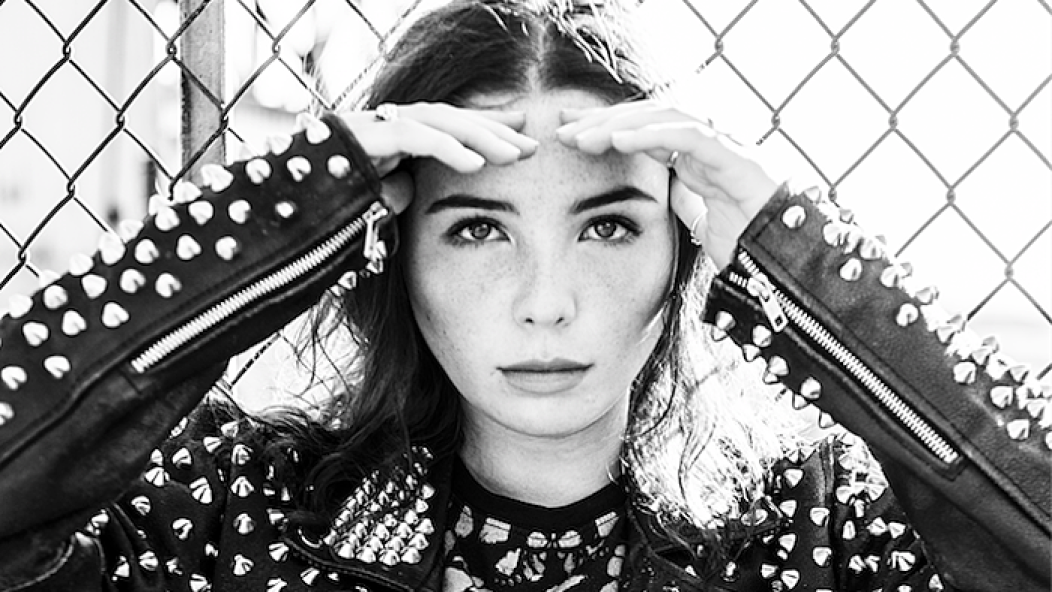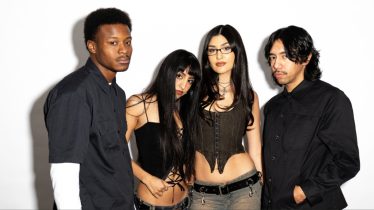
Chris Cornell's daughter Lily wants to destigmatize mental health
While most of the globe has transitioned into COVID-related lockdowns and restrictions for the better half of 2020, it’s no surprise that people are seeking answers on how to maintain their mental health. During these unprecedented times, Lily Cornell Silver, the daughter of Soundgarden’s Chris Cornell and Susan Silver, has admittedly struggled with her own mental health during the quarantine.
With the anniversary of her father’s passing looming over her in May and a strict lockdown throughout the U.S., Cornell utilized her struggle to push forward and create her new IGTV series, Mind Wide Open. As a means to use both her platform and experience, Cornell’s powerful series focuses on creating an accessible space for open communication and awareness revolving around mental health.
Launching her initiative on what would have been her father’s 56th birthday, Cornell’s Mind Wide Open highlights significant struggles such as suicide, racial violence, homophobia and more through her experiences and the professions of her guests. Although the series is still in its infancy, Cornell’s mission to destigmatize mental health and create an open dialogue is long overdue.
Read more: Halloween is starting early this year with Shudder’s new horror lineup
Let’s start with the series title, Mind Wide Open. Where did you come up with the name?
I was in a poetry class in high school, which is such a Seattle thing to do. [Laughs.] But I had to write an archive piece, and my dad gave me some lyrics that he’d written in the ’90s for a song that I don’t think ever came out. One of the lyrics was “Death is the mind wide open.” And that really, really stuck with me from the time he gave that to me in 2016. That’s really stuck with me over time. And it made me think there are so many other ways to have your mind wide open. For me, music is a way to have your mind wide open, or openly discussing mental health is a way to have your mind wide open. So especially since losing my dad, that’s been something for me to think about a lot. What are other ways to feel fulfilled and other ways to be present in this moment? I think the series is definitely one of those for me.
That’s lovely because you’ve got a piece of your dad right there with you no matter who you’re talking to or what the subject matter is. When did you first decide that you were going to start this series focused around mental health and incorporate open discussions on homophobia, suicide and substance misuse, to name a few?
I was in quarantine when I came up with the idea. My own mental health was really struggling. Basically, everyone I know was really, really struggling with their mental health. [Laughs.] And it’s something that I have a lot of experience in. Obviously, I’m not a mental health professional, but I’ve experienced a lot in my lifetime, and I know a lot of people and have a lot of connections to people who have also experienced a lot in their lifetime. And it just feels really important for me to give back in any way I possibly can. I felt like this was a powerful way to use my platform and help in any way possible.
What is the mission of Mind Wide Open?
The keyword for me is accessibility. The goal is to normalize conversations around mental health and destigmatize [it] as a subject in general. I think having open conversations and making them as accessible as possible and not necessarily just rooted in academia or only accessible if you have a psychiatrist or a therapist [is important]. I’m wanting it to be accessible to everybody because struggling with mental health is something that everyone experiences at some point in their lifetimes.
Because you’re creating a series that focuses on mental health and having these open dialogues through an accessible means, such as social media, what do you hope your viewers are going to get from you and your guests on the series?
For me, I want to be an example of somebody who has been through shit and will talk about it and be open about it. I don’t like the idea that I’ve come out on the other side. It’s that I have learned tools to continue to cope every day. And to get through each day and to help myself when I need it. So for me, I just want to be somebody who can talk about that openly and say I still struggle every day, and this is what works for me, and this is how I deal with it. And to have guests on the show who can provide any insight, especially public figures who people may really admire and look to, someone like Duff McKagan and see, “Here’s a person I really admire, and he struggles with the exact same things I do.” For that to be a beacon of hope as well.
I think to your point, the idea of “on the other side” is different for everybody. So you’re creating an open, crucial dialogue that is relatable vs. creating this fictitious other side.
Right, exactly and that’s something I really struggled with. With grief, it’s like, “OK, what am I going to do? When is this going to be over?” Something I really had to learn and assimilate is it doesn’t end necessarily. You just grow, and you learn tools to cope and ways to be happy in your day-to-day life. But still carrying that piece of it with you.
You launched Mind Wide Open on your father’s 56th birthday. Tell us about the significance of waiting to launch your premiere episode on that date. What did that signify for you personally?
Well, as we talked about, the title of Mind Wide Open was in his honor. The whole idea [was that] I wanted to launch [this] in his honor. I launched the initiative on the anniversary of his passing in May. But I put a ton of work into it and was working really hard. It honestly ended up being super serendipitous the way that it worked out. Because [with] the editing process and getting all my guests together, the production team I’m working with said the earliest we can get it done is July 20. And I was like, “That’s perfect. That’s amazing.” It made it that much more special for me because obviously that’s a very significant day for me. And also the passing of Chester Bennington, who is super near and dear to me. He was somebody that I thought about a lot in the series as well in terms of suicide awareness and suicide prevention. It’s definitely significant and held a lot of meaning for me.
Absolutely. It’s obviously something very personal for you. When you launched your first episode, what emotions were you feeling?
For people that know me, [they know] I’m someone who is so open. And that has a lot to do with my mom. She raised me to not feel any shame around my own emotions and to be someone who can be open to others and let others be open to me. So it was a no-brainer for me. I was like, “I want to be open, and I am an open person, so I’m just gonna share whatever I have to share.” But then the second I hit upload on that day, I was like, “Oh, shit.” [Laughs.] Like, “My God, I just gave away so much information. I’m being very vulnerable right now.” But there’s also so much power in that. And I do feel really good about it. And the response has been so amazing. People finding power in my vulnerability and finding validation or solace in my vulnerability has been super powerful and makes me really happy.
How have you gone about selecting your guests for the series? Do you have perceived notions on the subjects you’re covering before an interview?
I definitely have the privilege to have access to a lot of amazing people. And that’s where the series was born from for me. I have all these amazing people who have all this incredible insight. My first episode was with Laura Lipsky, who has been someone who’s been a mother figure to me and helped me through so much. And it just was like, “I need everyone to hear what you have to say.” That idea of accessibility was really important for me in having all of these amazing people that I have access to and that have helped me so much to provide insights to other people. But also the diversity of guests is really important to me as well—having mental health professionals who can provide insight about specific instances and then [having] people my age who can give insight into what mental health looks like for us. Then in public figures who, as I said, can provide some hope or provide some vulnerability. So it spans a very wide range. I love having it be a very diverse group.
Absolutely. You recently had Duff McKagan of Guns N’ Roses on the series. What was the hardest part of listening to his story of substance misuse and panic attacks given that he’s a musician?
It’s something that I’ve grown up around, and my mom has been in this industry since she was my age. It’s something that she’s had a lot of experience with and [a subject] her and I have talked about a lot. [It’s] something that I’ve definitely witnessed the effects of. But among so many people I know so honestly, it was really very hopeful to me and very powerful to me to hear Duff talk about it because it is something that’s so near and dear to me and something that I’ve had to witness so many times in my life. So to see somebody that I really, really admire, like Duff, and who I love so much, say, “I went through the same exact thing, and this is how I got out of it, and this is how I deal with the day to day.” I think it’s so powerful. He’s changing a lot of lives in that regard.
How has the experience of creating Mind Wide Open allowed you to grow and continue your journey to the pursuit of mental wellness?
I think for me, mental health has been something in the past that I’ve tried to run from. Grief and loss have definitely been something in the past that I’ve tried to run from. And the main advice my therapist gives me is [to] feel your feelings. You have to feel it to heal it. So this series has been a way of me reclaiming that and allowing myself to delve into what I’m feeling in a safe space with people who can validate me and people who can give me insight and give others insight. The main thing for me has always been giving back in whatever way I can and using my platform in whatever way I can to be of service to others. So that part of it has been immensely healing.
You can watch all of Lily Cornell Silver’s Mind Wide Open episodes here.







